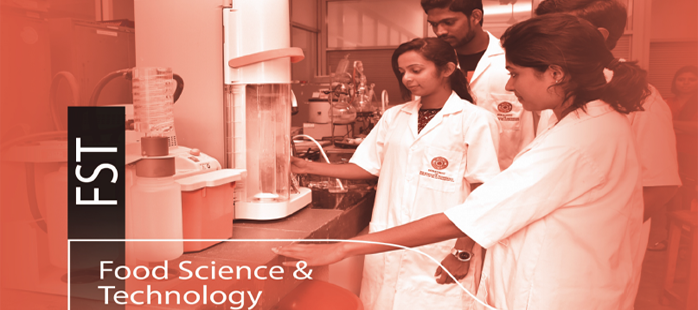Food Science and Technology – B.Sc. (Special) Degree Program
Duration: 4 years
For whom?
Biological Science students who are selected by University Grants Commission (UGC) through a special window. The intake is limited to maximum of 50 students per academic year.
Opportunities
There is a big demand for FST graduates in food ingredient manufacture, food plant equipment and packaging manufacture, food service, government administration/ food legislation/ food technology. public analysts in laboratories, environmental health department, trading standards and department, journalism/ information service, research and education institutes and associations, overseas locations (food sector), and consulting (local and international).
Course Overview
The B.Sc degree in Food Science and Technology has been designed to enable the prospective FST graduates to be able to demonstrate excellence in their future professions through transferring the knowledge and practical skills related to all subjects and facilitating to apply both theoretical knowledge and related practical skills appropriately in different situations. It is also expected that they will develop their technical competencies in order to meet any challenging situation in the food industry.
The abilities and skills expected to transfer to the SJP FST graduates through the degree programme include intellectual skills, practical skills, research skills, generic skills, numeracy skills, communication skills (with special emphasize on scientific communication technology skills (ICT), interpersonal team work skills, self management and professional development skills.
Course structure
Students are required to take course units in FST having a cumulative credit value of 120. These include compulsory, core and elective course units. In addition, the student are also offered non-credit base course units throughout the course. Compulsory and core course units are designed to provide student with the knowledge essential in working in the field of Food Science and Food Technology of both. The In-plant training programme focusing of real world industrial exposure (in fourth year first semester) and graduate research project (in fourth year second semester) are two vital components to facilitate our undergrad in getting hands on experience and in applying the concepts they learned in the classroom into practices and research.
Mode of lnstruction and Assessment
Student enrolled in both general and special degree programme will be taught by academic staff with well established track record. The medium of instruction is English. The course units include; lectures, assignments, individual and group project, field classes and laboratory practicals. They are assessed through end-of semester written examinations, practical examination, presentations and reports.
B.Sc. (General) Degree Programme with Food Science and Technology
Duration: 3Years
For Whom?
This course is for students from the Biological Science stream who are interested in pursuing careers in Food Science. The intake is limited to a maximum of 30 students per academic year.
Career opportunities
Food Science and Technology is a fast growing and diversifying industry. Graduates offering FSC as a subject have many opportunities to apply their knowledge to solve problems associated with food packaging, shelf-life, etc.
Course overview
This course is aimed at equipping students with knowledge and skill in a range of key disciplines related to Food Science along with employability, skill such as ICT, problem solving, team work, self management and professional development.
Course structure
Food Science will constitute one third of the B.Sc. (General) degree programme. Students are required to take course units in FSC having a minimum cumulative credit value of 30. These include compulsory. core and optional course units.
Course Units
click here to view course units
For further information please contact:
Dr. M.A. Jagath Wansapala
Head/Department of Food Science and Technology
Email: majwpperera@yahoo.com
jwansapala@gmail.com


